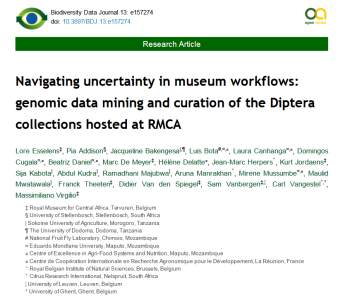New research: unlocking genomic data from RMCA’s Diptera collections

The Royal Museum for Central Africa (RMCA) houses one of the world’s largest collections of African fruit flies (Tephritidae) and hoverflies (Syrphidae), with over 100,000 specimens carefully preserved. These collections are a critical resource for biodiversity research, but unlocking their hidden genetic information has long been a challenge.
As part of the InsectMOoD project, RMCA molecular biologist Lore Esselens has published her first first-author paper, presenting new insights into how genomic data can be successfully retrieved from museum specimens, even those collected decades ago under unknown field conditions.
In the study, the research team tested streamlined workflows for DNA extraction and whole-genome sequencing on more than 1,400 insect vouchers from RMCA’s Diptera collection. The findings demonstrate that Illumina short-read sequencing can work remarkably well, even when dealing with degraded material, making it a powerful tool for genomic data mining in large museum collections.
An important outcome of this work is the integration of genomic data and metadata into RMCA’s archiving system, ensuring better long-term preservation, improved traceability of genetic resources, and enhanced scientific value of the Diptera collections.
Read the full article (open-access) here.